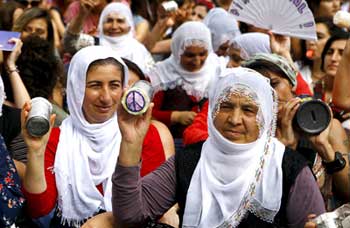

Vol. 79/No. 29 August 17, 2015

|
| Reuters/Osman Orsal |
| Rally in Istanbul Aug. 1 calls for halt to Turkish government bombing of Kurdish camps in northern Iraq and raids against those accused of ties to Kurdistan Workers Party in Turkey. |
The Turkish rulers are alarmed over advances made by Kurdish fighters in Syria in driving back Islamic State and the impact this has on the 15 million Kurds in Turkey, giving confidence to those fighting for Kurdish self-rule.
The Kurds, some 30 million people residing in Iraq, Iran, Syria and Turkey, have been fighting against national oppression and for a homeland for decades. This was denied to them by the imperialist powers of London and Paris a century ago when they carved up the region. The division has been backed by Washington and enforced by the local capitalist rulers ever since.
In a deal giving Washington access to the strategic Incirlik Air Base in southern Turkey, Turkish President Recep Tayyip Erdogan announced plans to set up a buffer zone in northern Syria. Ostensibly airstrikes would drive Islamic State from this border area. The zone, however, would be situated to prevent further advances westward by Kurdish People’s Protection Units (YPG) in Syria toward the Kurdish-run area of Afrin. Erdogan is determined to block the unification of all of Syria’s Kurdish regions along Turkey’s border.
It is abundantly clear Ankara’s target is the Kurds, not Islamic State. “Between July 23 and July 26, 75 Turkish jets flew 155 sorties against 400 or so PKK targets,” reported Time magazine. “Number of ISIS [Islamic State] targets hit? Three.”
Police raids in Turkey
Erdogan also launched police raids that he claimed are aimed at Islamic State supporters and the PKK. Of the more than 1,300 people arrested in 39 provinces, however, nearly 85 percent were Kurds accused of being members of the PKK or its youth group and some members of the pro-Kurdish People’s Democratic Party (HDP). The Turkish government, which reached a cease-fire agreement with the PKK in 2013, brands the Kurdish group as a terrorist organization, as does Washington.As residents of the Kurdish city of Diyarbakir, Turkey, banged pots and pans from their windows and balconies to protest the airstrikes, “police used tear gas, sometimes fired from helicopters, to quell demonstrations,” reported the Wall Street Journal July 29.
As Ankara launched its assault on the Kurds it requested and received backing from the U.S.-led NATO military alliance. A statement issued at a special July 28 meeting condemned “the terrorist attacks against Turkey” and said that NATO member states “stand in strong solidarity with Turkey.”
About 260 members of the PKK were killed and some 400 injured through airstrikes in northern Iraq, reported the Turkish Anadolu Agency Aug. 1. The bombings have spread fires and destroyed a health clinic serving several villages.
A statement issued Aug. 1 by Massoud Barzani, president of the Kurdish Regional Government in Iraqi Kurdistan, called for the Turkish military to stop the airstrikes. It also said the PKK should “keep the battlefield away from the Kurdish region, to ensure the civilians of Kurdistan don’t become victims of that fighting and conflict.”
Several days earlier PKK fighters attacked an oil pipeline in southeast Turkey that the KRG uses to export oil through Turkey’s Ceyhan port on the Mediterranean Sea. A statement issued by the PKK Aug. 2 said its units “did not know to whom the pipeline belonged,” reported Rudaw, a Kurdish online news agency. Turkey has become the main trading partner of Iraqi Kurdistan, with some 1,200 Turkish companies operating there.
Erdogan seems “more alarmed by the prospect of Syrian Kurds establishing another self-governing entity on Turkey’s frontier, alongside the quasi-independent Kurdistan Regional Government in northern Iraq,” than about IS, the Financial Times noted. When the YPG captured Tel Abyad in June, “clearing Isis from that part of the border and cutting its supply lines out of Turkey, Ankara did not celebrate but warned Syrian Kurdish fighters against moving any further.”
Ankara targets Kurds in Syria
The YPG accused the Turkish government of targeting its fighters at least four times over the past week. On July 30 Turkish aircraft flew over Kobani, Syria, as Islamic State attacked the nearby town of Sarrin that YPG forces had succeeded in taking from IS forces three days earlier. “We consider recent movements of the Turkish military as provocative and hostile actions” and demand they “immediately stop,” said an Aug. 1 statement from the YPG General Command.Erdogan is seeking to strip People’s Democratic Party legislators of immunity from prosecution if they can be linked to PKK. The Diyarbakir Public Prosecutor’s Office has launched an investigation against Co-chair Selahattin Demirtas for his role in backing protests in October protesting the government’s refusal to help fighters in Kobani fend off the siege imposed there by Islamic State. If convicted he could be imprisoned for 24 years.
HDP’s other Co-chair Figen Yuksekdag is also being investigated for remarks she made at a June rally in Suruc, Turkey, about Kurdish fighters in Syria. “We lean back on YPG, YPJ and PYD,” Yuksekdag said, according to Firatnews. YPJ is the women’s militia fighting alongside YPG. PYD is the Democratic Union Party of which YPG is its military wing. “If you lean back on the terrorist organization, you are going to pay for it,” responded Erdogan.
Meanwhile, Washington is deepening its military role in Syria’s civil war beyond ongoing airstrikes against Islamic State. President Barack Obama has authorized use of airstrikes to back the relatively small core of U.S.-trained forces on the ground in Syria, setting up a potential military conflict with Syrian government forces or other groups, such as al-Qaeda-based Nusra Front.
Related articles:
Join protests to demand end to anti-Kurd attacks!
NY protest condemns bombing of Kurds
Front page (for this issue) |
Home |
Text-version home